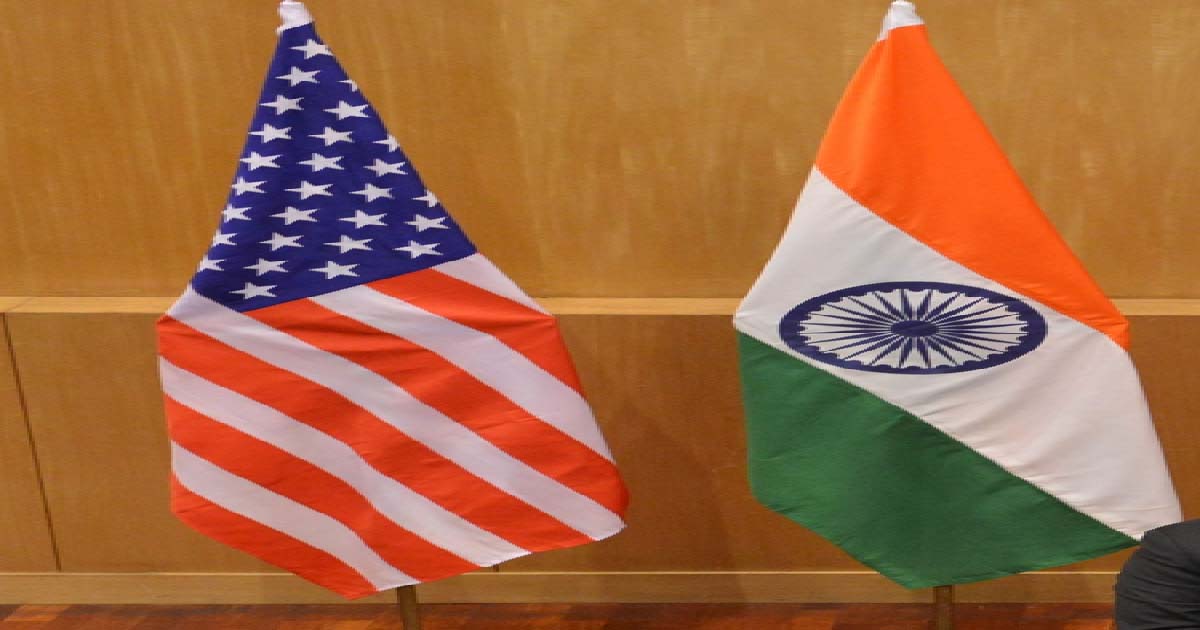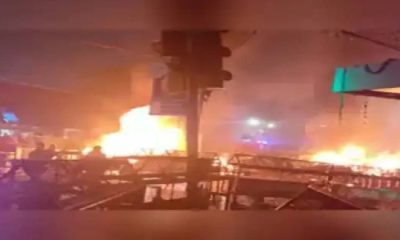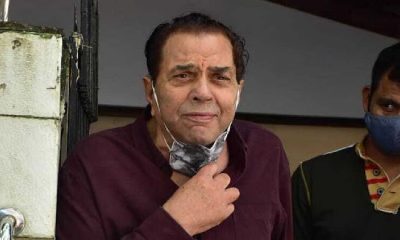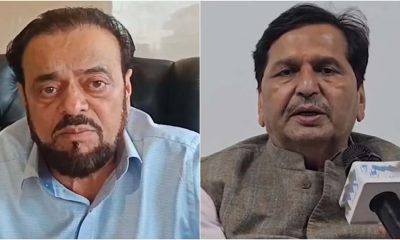International News
Efforts continue to advance Gaza peace talks: Hamas

Gaza, March 12: Hamas said that Egyptian and Qatari mediators are continuing efforts to finalise the implementation of the ceasefire agreement and initiate the second phase of negotiations.
In a press statement, Hamas spokesman Abdul Latif Al-Qanou said on Tuesday that Egyptian and Qatari mediators have been working to complete the ceasefire agreement and move forward with the second phase of negotiations, Xinhua news agency reported.
“There are positive signs in this regard,” said Al-Qanou, adding that Hamas is prepared to engage in upcoming negotiations in a manner that meets the demands of the Palestinian people.
He also called for increased efforts to provide humanitarian relief to the Gaza Strip and lift the ongoing blockade.
According to Al-Qanou, a Hamas leadership delegation arrived in Cairo on Monday and discussed mechanisms for initiating the second phase of negotiations.
Meanwhile, senior Hamas leader Abdul Rahman Shadid stated in a televised conference that Israel continues its “criminal policies” against Palestinians in the West Bank, Jerusalem, and Gaza.
He accused Israel of killings, displacement, mass arrests, blocking food and medical aid, and closing border crossings — worsening the humanitarian crisis in the Strip.
Shadid highlighted that Israel’s military operation in Jenin and its refugee camp has entered its 51st day, while similar actions in Tulkarm and its camps, Nour Shams and Tulkarm, have continued for 43 days.
He described these operations as part of Israel’s broader strategy to expand settlements and impose a new reality on Palestinian territories.
International News
ECI hosts global delegates during Bihar elections under poll visitors’ initiative

New Delhi, Nov 6: As polling for the first phase of the Bihar Assembly elections got underway on Thursday, the Election Commission of India (ECI) on Thursday welcomed 16 delegates from six countries under its International Election Visitors’ Programme (IEVP).
The initiative, aimed at fostering global cooperation and transparency in electoral processes, saw participants from Colombia, Indonesia, Thailand, The Philippines, Belgium, and South Africa witnessing the on-ground arrangements of one of the world’s largest democratic exercises.
“Under the International Election Visitors’ Programme (IEVP) of the ECI, 16 delegates from 6 countries – Colombia, Indonesia, Thailand, Philippines, Belgium, South Africa are witnessing the never before arrangements made by the ECI,” the poll panel said on X.
According to the ECI, the IEVP 2025 began earlier this week at the India International Institute for Democracy and Election Management (IIIDEM) in New Delhi on November 4.
The inaugural session was chaired by Chief Election Commissioner Gyanesh Kumar and Election Commissioner Vivek Joshi, who interacted with the visiting delegates and briefed them about India’s robust electoral framework.
During the Delhi leg, participants were given a detailed presentation on the functioning of Electronic Voting Machines (EVMs), voter roll management, and logistical preparedness.
“IEVP includes a two-day tour of Bihar from November 5-6, 2025 where the participants will visit the EVM dispatch centres and witness the actual polling on November 6, 2025,” the ECI said in its Press note earlier.
The IEVP is a flagship program of the ECI for international cooperation and engagement with the Election Management Bodies (EMBs) of other countries and international organisations.
The IEVP, launched in 2014, serves as the ECI’s flagship platform for international engagement with Election Management Bodies (EMBs) and global democratic institutions. Through this programme, India showcases its electoral best practices and fosters mutual learning with partner nations.
This year’s edition underlines India’s growing role as a leader in electoral management, with the ECI using the Bihar polls as a live demonstration of its operational scale, transparency, and integrity.
Crime
D-Syndicate looking to expand narco trade into Southern and Northeastern routes, warn Intelligence agencies

New Delhi, Oct 30: In recent months, the Narcotics Control Bureau (NCB) has been cracking down heavily on the Dawood Ibrahim-linked drug network in India.
The arrests of Danish Chikna and Mohammed Salim Sheikh have dealt major blows to the Dawood network, and this has prompted the syndicate to look for newer avenues.
As Intelligence agencies continue to focus heavily on the networks in Maharashtra and neighbouring states, the D-Syndicate is looking to expand its networks in the northeastern and southern states of India.
Action would be taken similarly in these parts of the country. However, it is necessary to bust the networks in states such as Maharashtra and Gujarat, which have been the traditional playground of the syndicate for a long.
While Dawood Ibrahim has diversified his business in various parts of the country, the command centre remains in Maharashtra.
The people working for the network in this sector control the businesses across the country, and hence, breaking their backs first is important. This would eventually lead to the weakening of the networks in other parts of the country.
Operations in the northeastern and southern states are currently overseen by Haji Salim, an ISI stooge and a member of the Dawood network.
Salim has been playing a big part in the D-Syndicate after Dawood’s right-hand man, Chhota Shakeel, has gone mysteriously quiet.
With Dawood’s brother Anees Ibrahim put in charge of the International wing, which does business mostly in African nations, the onus of the Indian markets has largely fallen upon Salim.
According to Intelligence agencies, the ISI and syndicate have now instructed Salim to focus entirely on the southern and northeastern sector as they feel that there is a major potential.
The syndicate sees potential in the northeast owing to the existing routes from Myanmar. With Bangladesh opening up completely to the ISI, the syndicate sees further potential in this sector.
In the South, the syndicate’s network exists. However, this network has largely focused on smuggling drugs out of the country. The narcotics would first be smuggled into the southern states, especially Kerala and Tamil Nadu, and later, to the international markets such as Thailand through the Sri Lanka route.
An Intelligence Bureau official says that the syndicate is also looking to bring in more drugs through Sri Lanka before distributing it in the Indian market.
While the international market is huge for the syndicate, it is not ready to let go of India, as demand is huge.
The syndicate not just wants to cover its losses in Maharashtra, but also the ones it is incurring in Punjab.
Several attempts to bring in drugs through the Punjab route using both couriers and drones are failing owing to heavy scrutiny and security. Hence, the Dawood network wants to take maximum advantage of the southern route so that it can smuggle drugs in huge quantities and then distribute them to the Indian market.
To bring in drugs from the international market, the syndicate would use the route from Sri Lanka. The network would look to smuggle the consignment into Tamil Nadu and Kerala before supplying it into the Indian market.
According to officials, the network feels that this would be an easier route, as most of the consignments in the Indian market will be transported via land route.
The scrutiny at the southern international borders is relatively less when compared to the borders along Punjab or Jammu and Kashmir. Further, using the land route to smuggle drugs into India would also attract less scrutiny, and the syndicate hopes there would be more hits than misses.
Another official also pointed out that the D-Syndicate is also tapping into the illegal immigrants who have settled in South India in huge numbers. They could be used as carriers to supply the drugs into the Indian markets, officials also warned.
Business
US lawmakers unite to defend bilateral ties with India through letters and resolutions

Washington, Oct 28: Both Republican and Democratic lawmakers have joined hands to support the India-US relationship, months after the Trump administration announced a series of policies targeting Indian interests.
At least six bipartisan letters and resolutions have been drafted over the past 10 days defending the interests of the Indian American community, reaffirming support for the India–US partnership, and pressing the administration for accountability over its recent actions targeting New Delhi.
Last week, a group of House members expressed concern that an event at Rutgers University on Monday could “fuel further prejudice” against Hindus at a time when Hindu temples have been targets of violence.
The co-signers of the letter were Democrats Sanford Bishop from Georgia, Shri Thanedar from Illinois, and Suhas Subramanyam from Virginia, and Republican Rich McCormick, also from Georgia.
Two days earlier, another bipartisan group of six House Representatives wrote to US President Donald Trump and Commerce Secretary Howard Lutnick, expressing concerns over the H-1B proclamation.
“We are concerned that the recent proclamation related to H-1B visa petitions will create significant challenges for US employers and overall weaken our competitiveness,” the letter stated.
The group again included Democrat Suhas Subramanyam along with Republican Congressmen Jay Obernolte and Don Bacon, among others.
On October 17, four US lawmakers wrote to President Donald Trump, urging him to attend the Quad Leaders’ Summit in India and other meetings in Asia.
The same day, a bipartisan resolution was introduced in the House of Representatives to recognise the “contributions made to the United States by the Indian American diaspora” and condemn recent acts of racism against Indian Americans.
The resolution also termed the India-US relationship as “one of the most important democratic partnerships in the world”.
It was a sharp departure from just days earlier, when 19 House members, all Democrats with no Republican support, wrote to President Donald Trump on October 8, urging him to “reset and repair” the India-US “critical partnership”.
Leaders from both Democratic and Republican parties have faced criticism for mostly remaining silent as senior officials of the Trump administration, like Trade Advisor Peter Navarro and Commerce Secretary Howard Lutnick, repeatedly targeted India over its purchase of Russian oil and trade imbalance.
In August, the Trump administration imposed 50 per cent tariffs on New Delhi, which included a 25 per cent levy for importing Russian oil.
Then, in September, President Donald Trump signed a proclamation on H-1B visas, imposing a $100,000 application fee to restrict the programme. Over 70 per cent of the approved H-1B applications in 2024 went to Indian nationals.
While a handful of Democrats opposed the administration’s stance publicly, Republican lawmakers, until recently, decided to keep quiet.
In early October, Democratic Representative Ami Bera, a leading advocate of the US-India relationship, told Media that some Republican lawmakers have remained silent out of fear of the president.
“I think they’re certainly afraid to take on President Trump directly,” he said.
In recent weeks, ties have stabilised, and negotiators have resumed talks to finalise the first phase of a trade agreement.
Last week, President Donald Trump held a special Diwali event at the White House where he termed Prime Minister Narendra Modi “a great person” and said he loves “the people of India.”
Bera added that more members should come out to support the relationship.
“Instead of making this about President Trump, let’s make it about the US-India relationship. Let’s make it about what we think as members of Congress – Democrats and Republicans. I don’t want the India-US relationship to be a Democratic thing or a Republican thing. It should be an American thing,” he told Media.
-

 Crime3 years ago
Crime3 years agoClass 10 student jumps to death in Jaipur
-

 Maharashtra1 year ago
Maharashtra1 year agoMumbai Local Train Update: Central Railway’s New Timetable Comes Into Effect; Check Full List Of Revised Timings & Stations
-

 Maharashtra1 year ago
Maharashtra1 year agoMumbai To Go Toll-Free Tonight! Maharashtra Govt Announces Complete Toll Waiver For Light Motor Vehicles At All 5 Entry Points Of City
-

 Maharashtra1 year ago
Maharashtra1 year agoFalse photo of Imtiaz Jaleel’s rally, exposing the fooling conspiracy
-

 National News1 year ago
National News1 year agoMinistry of Railways rolls out Special Drive 4.0 with focus on digitisation, cleanliness, inclusiveness and grievance redressal
-

 Maharashtra12 months ago
Maharashtra12 months agoMaharashtra Elections 2024: Mumbai Metro & BEST Services Extended Till Midnight On Voting Day
-

 National News1 year ago
National News1 year agoJ&K: 4 Jawans Killed, 28 Injured After Bus Carrying BSF Personnel For Poll Duty Falls Into Gorge In Budgam; Terrifying Visuals Surface
-

 Crime1 year ago
Crime1 year agoBaba Siddique Murder: Mumbai Police Unable To Get Lawrence Bishnoi Custody Due To Home Ministry Order, Says Report





















